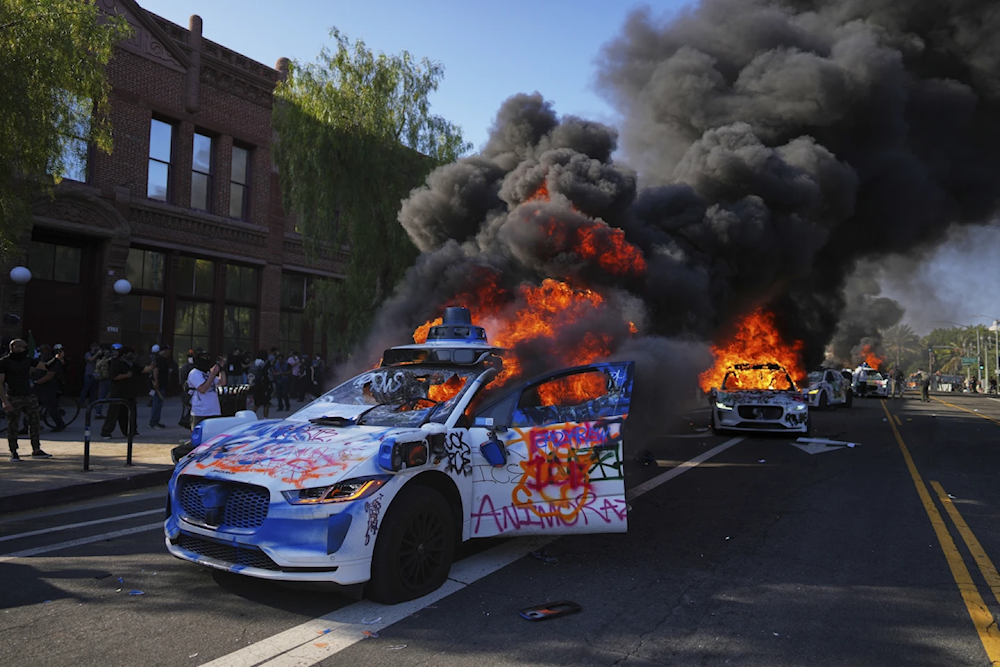Federal judge blocks Trump’s deployment of National Guard to LA
A judge has ruled Trump's move illegal, siding with California Governor Gavin Newsom in a major legal dispute.
-

Multiple Waymo taxis burn near the Metropolitan Detention Center of downtown Los Angeles, June 8, 2025, following an immigration raid protest (AP)
A federal judge has blocked the Trump administration's attempt to deploy California's National Guard to Los Angeles, ruling the move illegal and ordering control of the troops returned to California Governor Gavin Newsom.
US District Judge Charles Breyer issued the decision on Thursday, stating that US President Donald Trump did not follow the law set by Congress when ordering the deployment without the state’s consent. The order, however, has been temporarily halted until Friday afternoon to allow the administration to appeal, which it did almost immediately.
“The question before the court is whether the president complied with the legal framework set by Congress when deploying a state’s National Guard,” Judge Breyer wrote.
“He did not. His actions were illegal... He must therefore return control of the California National Guard to the Governor of the State of California forthwith.”
Judge Breyer emphasized constitutional limits on presidential authority during a packed courtroom hearing, at one point holding up a pocket copy of the Constitution. “The president is, of course, limited in his authority,” he said. “That’s the difference between a constitutional government and King George.”
California’s lawsuit argues protests did not constitute rebellion
The ruling stems from a lawsuit filed Monday by the state of California against Trump’s order, which sent 4,000 National Guard troops and 700 Marines into Los Angeles amid ongoing protests against the administration’s immigration crackdown.
The Trump administration had invoked a federal law that allows the president to federalize the National Guard in the event of a rebellion. California countered that the protests, despite over 300 arrests and the brief closure of a major freeway, did not meet that threshold.
“At no point in the past three days has there been a rebellion or an insurrection,” the state’s lawsuit stated. “Nor have these protests risen to the level of riots seen in recent years.”
Governor Gavin Newsom celebrated the court’s decision, posting on social media that “the court just confirmed what we all know — the military belongs on the battlefield, not on our city streets.”
The Trump administration, however, defended its actions by claiming it needed to secure Immigration and Customs Enforcement (ICE) agents who were conducting raids in Los Angeles. Attorney Brett Shumate argued that the president had full authority over military operations and that Newsom had been notified of the order in advance.
You sent your troops here without fuel, food, water or a place to sleep.
— Gavin Newsom (@GavinNewsom) June 9, 2025
Here they are — being forced to sleep on the floor, piled on top of one another.
If anyone is treating our troops disrespectfully, it is you @realDonaldTrump. https://t.co/4i8VIiYZLr pic.twitter.com/sUYD2KHu6O
“Governor Newsom was fully aware of this order… he objected to it,” Shumate said in court. “There is one commander-in-chief of the US armed forces.”
Judge Breyer interrupted, “No. The president isn’t the commander-in-chief of the National Guard.” He clarified that under the Constitution, the president can assume control of the Guard only under specific, limited circumstances.
Historic context: rare federal override of state National Guard
The case marks a rare instance in modern US history where a president has attempted to override a state governor's control of the National Guard without consent. The last time such a deployment occurred was during the civil rights era more than 50 years ago.
Typically, governors activate National Guard troops in response to natural disasters or emergencies, with the option of requesting federal support. Unilateral federal action is almost unprecedented in the post-Vietnam War era.
As the legal battle continues, the court’s ruling sets a clear precedent: presidential authority over state military resources remains subject to constitutional limits, even in times of unrest.

 4 Min Read
4 Min Read








